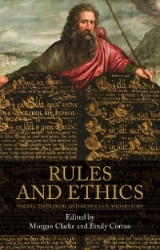Details

Rules and ethics
Perspectives from anthropology and history|
129,99 € |
|
| Verlag: | Manchester University Press |
| Format: | EPUB |
| Veröffentl.: | 10.08.2021 |
| ISBN/EAN: | 9781526148896 |
| Sprache: | englisch |
| Anzahl Seiten: | 256 |
DRM-geschütztes eBook, Sie benötigen z.B. Adobe Digital Editions und eine Adobe ID zum Lesen.
Beschreibungen
This book investigates the pronounced enthusiasm that many traditions display for codes of ethics characterised by a multitude of rules. Recent anthropological interest in ethics and historical explorations of ‘self-fashioning’ have led to extensive study of the virtuous self, but existing scholarship tends to pass over the kind of morality that involves legalistic reasoning.
<i>Rules and ethics</i> corrects that omission by demonstrating the importance of rules in everyday moral life in a variety of contexts. In a nutshell, it argues that legalistic moral rules are not necessarily an obstruction to a rounded ethical self, but can be an integral part of it. An extended introduction first sets out the theoretical basis for studies of ethical systems that are characterised by detailed rules. This is followed by a series of empirical studies of rule-oriented moral traditions in a comparative perspective.
<i>Rules and ethics</i> corrects that omission by demonstrating the importance of rules in everyday moral life in a variety of contexts. In a nutshell, it argues that legalistic moral rules are not necessarily an obstruction to a rounded ethical self, but can be an integral part of it. An extended introduction first sets out the theoretical basis for studies of ethical systems that are characterised by detailed rules. This is followed by a series of empirical studies of rule-oriented moral traditions in a comparative perspective.
This book provides a new, interdisciplinary perspective on the importance of detailed rules to many of the world’s ethical traditions. A valuable theoretical introduction sets the agenda for a series of comparative studies, spanning pre-modern Hindu ethics, Classical Rome and Christian casuistry, contemporary Judaism and the Islamic sharia.
<p>Introduction: rules and ethics – Morgan Clarke and Emily Corran<br><b>Part I: Rules enabling moral life</b><br>1 Conscience is tradition: classical Hindu law and the ethics of conservatism – Donald R. Davis, Jr.<br>2 Manners and morals: codes of civility in early modern England – Martin Ingram<br>3 Control of the self and the casuistry of vows: Christian personal conscience and clerical intervention in the twelfth and thirteenth centuries – Emily Corran<br><b>Part II: Rules and virtue</b><br>4 Rules and the unruly: Roman exemplary ethics – Rebecca Langlands<br>5 ‘For the love of God’? The First Commandment and sacramental confession in early modern Catholic Europe – Nicole Reinhardt<br>6 Counting good and bad deeds under military rule: Islam and divine bookkeeping in Nablus (Palestine) – Emanuel Schaeublin<br><b>Part III: Rules about rules</b><br>7 Tactics of transformation: self-formation and the multiplicity of authority in Polish conversions to Judaism – Jan Lorenz<br>8 Conscience and action in the Islamic <i>madhhab</i>-law tradition – Talal Al-Azem<br>9 Comparing casuistries: rules, rigour and relaxation in Islam and Christianity – Morgan Clarke<br>Afterword – James Laidlaw<br>Index</p>
<p>Morgan Clarke is Professor of Social Anthropology at the University of Oxford and Fellow of Keble College<br><br>Emily Corran is Lecturer in Medieval History at University College London</p>
<p>Ethical systems characterised by detailed rules – such as Islamic sharia and Christian casuistry – have often been dismissed as empty formalism or instruments of social control. This book demonstrates that, on the contrary, rules often enable, rather than hinder, personal ethical life.<br><br><i>Rules and ethics </i>assembles anthropologists and historians to explore cases of rule-oriented ethics and their dynamics across a wide range of historical and contemporary moral traditions. Examples of pre-modern Hindu ethics and codes of civility from early modern England demonstrate how rules can form an essential element of what Michel Foucault called ‘the care of the self’. Studies of Roman exemplary ethics, early modern Christian theology and the calculation of sin and merit in contemporary Muslim Palestine highlight the challenges posed by the coexistence of moral rules with other moral forms, not least those of virtue ethics. Finally, explorations of medieval and modern Islamic sharia, Christian casuistry and Jewish <i>halakha</i> all highlight how such traditions develop complex meta-rules – rules about rules – for managing the tensions and dilemmas that the use of rules can entail. <br><br>Together, these case studies and the theoretical framework proposed in the book’s introduction offer a more nuanced, cross-cultural appreciation of the role of rules in moral life than those currently prevalent in both the anthropology of ethics and the global history of morality.</p>


















